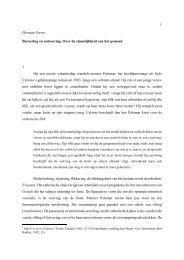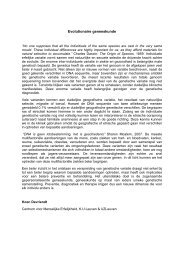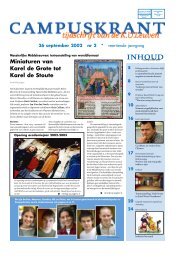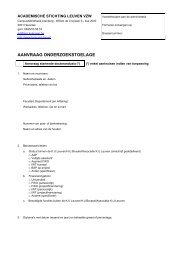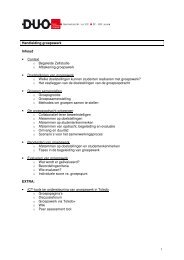EQUALITY GUIdE - KU Leuven
EQUALITY GUIdE - KU Leuven
EQUALITY GUIdE - KU Leuven
You also want an ePaper? Increase the reach of your titles
YUMPU automatically turns print PDFs into web optimized ePapers that Google loves.
Chapter 4 ! Scientific communication 217<br />
impact’, ‘I have problems with my voice, I get nervous’, ‘what if the chairperson is not<br />
recognized?’, ‘the type of meeting should always be announced in the agenda’.<br />
4.1.4.2. Meeting culture<br />
Each culture has its own meeting habits. In America and the Netherlands for example,<br />
you cannot speak about the meeting during the break. In Belgium, there is no such<br />
rule. You have to pay attention to new alliances, which can be set up during the break.<br />
There is also a difference between men and women. Women do not tend to discuss the<br />
meeting during the break. They rather talk about private matters.<br />
In Europe, it is not unusual for people to interrupt others in a conversation. It is even<br />
accepted. In Asia or America for example, that is not the case. Another example:<br />
women sometimes come up with emotional arguments. A good chairperson has to be<br />
able to objectify these judgements. Likewise, he or she must not hesitate to ask men,<br />
who in general have a more objective approach, how they feel about certain things.<br />
4.1.4.3. Voice<br />
A high voice during a meeting reveals agitation and dissatisfaction. Your voice is the<br />
echo of your heart. If you feel agitated or if you want to persuade people, talk slowly<br />
and quietly.<br />
4.1.4.4. Meeting roles<br />
A meeting is a democratic event: everyone has an equal part in it. The chairperson,<br />
however, is and remains the chairperson. He/she must have attention for the process,<br />
for the set-up and the aim of the meeting. Always respect the chairperson in his or her<br />
role. In case of negative behaviour or extreme disinterest, the chairperson can exclude<br />
you from the meeting. As a chairperson, you can also expect the participants to be<br />
prepared. To stimulate this, you can for example ask someone to summarize a note at<br />
the beginning of a meeting.<br />
Exercise<br />
The group is split up in small groups with one chairperson in each group. Each participant gets<br />
a card with a description of a certain ‘meeting role’. The participants have a meeting and are<br />
told to solve the problem or to counteract the process. Some typical roles are:<br />
! the apathetic: just wants to have a rest, meetings are a waste of time to him/her;<br />
! the joker: wants to make everyone laugh;<br />
! the chatterbox: talks the whole time;<br />
! the dominant: never stops peddling his/her opinions and points of view, problematic if the<br />
chairperson is like this;<br />
! the uncertain: wants to cooperate, but is afraid for responses. With a little push, you can<br />
involve someone like this in a positive way in the meeting.<br />
And then there are the bulldozer, the weak, the rebel, the echoer, the negativist, the strapper ...



